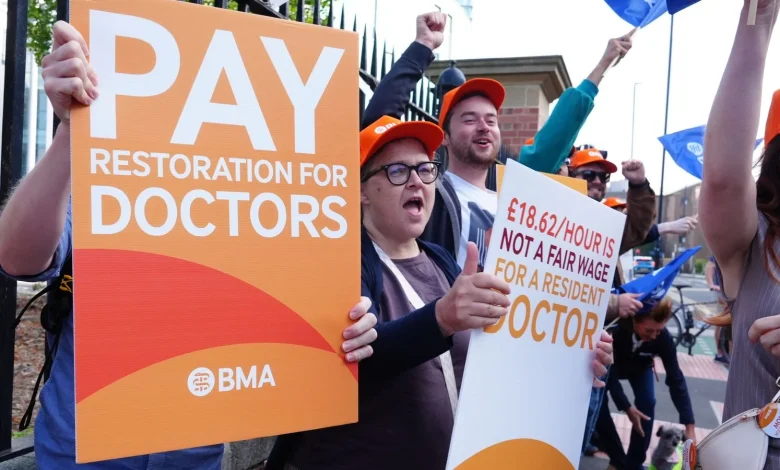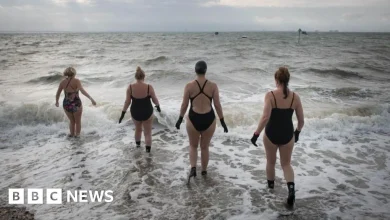Doctors in England begin five-day strike – here’s why and how NHS patients will be affected

Thousands of resident doctors in England are going on strike today, despite the government’s pushback against further disruption in the NHS.
It marks the 13th such walkout since March 2023, with this industrial action lasting from 7am today until Tuesday.
The health secretary has already refused to budge on demands for a pay uplift, while NHS health leaders have warned that continuing action could see frontline staffing, appointments and operations cut.
But the chair of the British Medical Association (BMA) defended the action and told Sky News that pay for medics is still “way down” compared with 2008.
Friday’s industrial action marks the 13th round of strikes since March 2023. File pic: PA
What are doctors striking for?
In brief, it’s about pay rises – the BMA is arguing that resident doctors – previously known as junior doctors – need a 26% pay uplift to restore their earnings, once inflation is taken into account.
However, the BMA chair told Sky News the dispute is rooted deeper in years of pay erosion that have left resident doctors far behind other public sector workers.
Speaking to Sky’s health correspondent Ashish Joshi, Dr Tom Dolphin said: “When we started the dispute… the lowest level of the resident doctors were being paid £14 an hour.
“There were some pay rises over the last couple of years that brought that partly back to the value it should be at, but not all the way.
“The secretary of state himself called it a journey, implying there were further steps to come, but we haven’t seen that.”
Dr Tom Dolphin defended the BMA action to Sky’s Ashish Joshi
The BMA has also warned doctors must not be called off industrial action to cover planned NHS work.
Dr Jack Fletcher, chair of the BMA’s resident doctors committee, even accused NHS managers of “emotionally blackmailing frontline staff”.
He said strikes “have not come out of the blue”, and added: “What has been offered so far still leaves thousands of resident doctors without a role this year, and the government seems determined to cut pay even further next year.”
That comment follows Wednesday’s news that thousands of job cuts at the NHS will go ahead, after £1bn needed to fund the redundancies was approved by the Treasury.
Should resident doctors get a pay rise? Have your say in the poll below.
Enable Cookies
Allow Cookies Once
What has the government said?
The government has already pointed out that its 29% settlement with junior doctors last year was one of the largest in the public sector and was intended to draw a line under two years of walkouts.
And Wes Streeting has been resolute in denying the BMA’s calls for a pay uplift. On Thursday evening, he shared a story from The Times, which reported a poll that suggested 48% of resident doctors wanted the action called off and only 33% thought it should go ahead.
“The BMA didn’t put our offer to their members, and now we know why: they wouldn’t have backed their unnecessary and irresponsible strikes,” he said on social media.
“They should give their members a say, call off these strikes and stop risking the NHS’s recovery.”
That poll surveyed 202 junior doctors, including 102 BMA members.
Enable Cookies
Allow Cookies Once
👉 Listen to Sky News Daily on your podcast app 👈
What’s likely to be affected?
While it remains to be seen what the strikes will impact, more than 54,000 procedures and appointments needed to be cancelled or rescheduled the last time resident doctors went on strike, despite the NHS keeping up 93% of planned activity.
The NHS Confederation and NHS Providers, which represent health trusts, said that continued strike action could lead to staff being cut and fewer tests, appointments, and operations being carried out.
They added that the knock-on effect for patients is that some will be forced to wait longer for care, and many may no longer be able to work without the treatment they need.
NHS England has urged patients to continue coming forward for care and attend any planned appointments unless they hear otherwise.
Patients who require emergency help should continue to use 999 or A&E as normal, while NHS 111 is also available alongside usual GP services.
Read more from Sky News:
Amber weather warning issued for parts of UK
Epstein calls Trump ‘dangerous’ in released email
How AI-generated music is fooling most of us
How much do resident doctors earn?
After the most recent pay awards following the last bout of industrial action, medical think tank the Nuffield Trust estimates a medic just out of university receives a basic salary of £38,831 in 2025/26.
They have estimated average earnings of £45,900 after factors like extra pay for unsociable hours are taken into account.
That average figure rises then to £54,400 by the second year, and a more senior speciality registrar earns an average of £80,500.
The BMA says that when the dispute started, the most junior doctors were making around £14 per hour. That works out at £29,120 per year for a 40-hour week.
That’s very close to the earnings of a doctor fresh out of medical school in 2022/23 – £29,384, according to Full Fact – but that’s over a 52-week year without taking into account paid holiday or unsociable hours.





